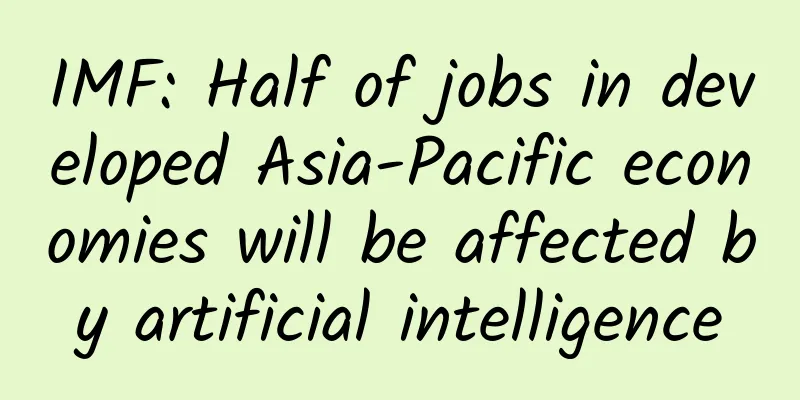IMF: Half of jobs in developed Asia-Pacific economies will be affected by artificial intelligence

|
The International Monetary Fund recently published a blog post stating that the labor markets of economies in the Asia-Pacific region are likely to change due to the impact of artificial intelligence, and developed economies will be more affected. About half of the jobs in developed economies in the region are affected by artificial intelligence, while in emerging markets and developing economies, this proportion is only about a quarter. The article states that more jobs in developed economies in the Asia-Pacific region will be supplemented by artificial intelligence, which means that the technology is likely to improve productivity rather than completely replace these jobs. Rising inequality between countries The article points out that the concentration of jobs supplemented by artificial intelligence in developed economies in Asia may gradually increase inequality between countries. About 40% of jobs in Singapore are considered highly complementary to artificial intelligence, while the proportion in Laos is only 3%. The article also points out that artificial intelligence may also exacerbate inequality within a country. In the Asia-Pacific region, most workers at risk of unemployment are engaged in service, sales and clerical support jobs. At the same time, workers who are more likely to benefit from artificial intelligence usually hold management, professional and technical positions, which are often already high-paying positions. The article states that women are more likely to be disrupted by artificial intelligence because they are more likely to work in service, sales and clerical jobs. In contrast, men account for a higher proportion of occupations that are unlikely to be affected by artificial intelligence at this stage. These occupations include farm workers, machine operators, and low-skilled entry-level workers. Regulatory policies to address inequality The study points out that building a sound social security system and carrying out professional skills reshaping for affected workers are the keys to achieving an inclusive transformation of artificial intelligence. In order to regulate the application of artificial intelligence, relevant departments need to introduce regulatory policies to ensure that the use of technology complies with ethical standards and strengthen data security. This will not only reduce the potential risks caused by artificial intelligence, but also give full play to its role in promoting economic development and improving efficiency. |
<<: Inside iOS 9.3.5: A detailed look at the biggest vulnerability in iOS history
Recommend
Calcium supplement, blood supplement, brain supplement...are these hidden "nutrition kings" on your table?
As people pay more and more attention to health c...
Are carriages 8 and 9 of the high-speed train not connected?
"Anyone who has taken the high-speed rail kn...
How does Tik Tok create a new traffic empire?
This explosive traffic platform, with its huge ce...
How to come up with a good public account name, just read this article
A long time ago, I saw a joke like this. The teac...
Why are mobile phones getting heavier?
In fact, you can find that mobile phones in the p...
When the museum’s treasures started playing with clay filters, I realized that introducing cultural relics could be so interesting!
Recently, the "clay filter" has been ve...
Sogou Maps launches mobile AR real-time high-precision navigation: real-time vehicle distance calculation, collision warning
On January 9, Sogou Maps launched the AR real-lif...
2022 Shenzhen New Energy Vehicle Subsidy Policy: The maximum subsidy for purchasing new energy vehicles in Shenzhen is 10,000 yuan?
In order to promote the continued recovery of con...
Google: Android TV games will disrupt Sony, Microsoft, and Nintendo
In the early days of the video game industry, com...
A Generation of Lifelong Learners - An Interview with Andy Matuschak
[[126900]] Andy Matuschak currently works at Khan...
This vegetable absorbs a lot of oil, but it is very suitable for losing weight!
There is a kind of food that is very suitable for...
Ten years of hard work? The first manned flight of the Starliner spacecraft is delayed again
Boeing's Starliner spacecraft was originally ...
Google Android 12 hardware requirements announced: 6GB RAM + 1080p screen recommended
[[429001]] According to news on October 14, Googl...
The new vocational education law is coming! Will your child have a better chance of going to college?
Mixed Knowledge Specially designed to cure confus...
AE animation tutorial video "The Secret of Keyframes"
Training course content: It covers every aspect o...









